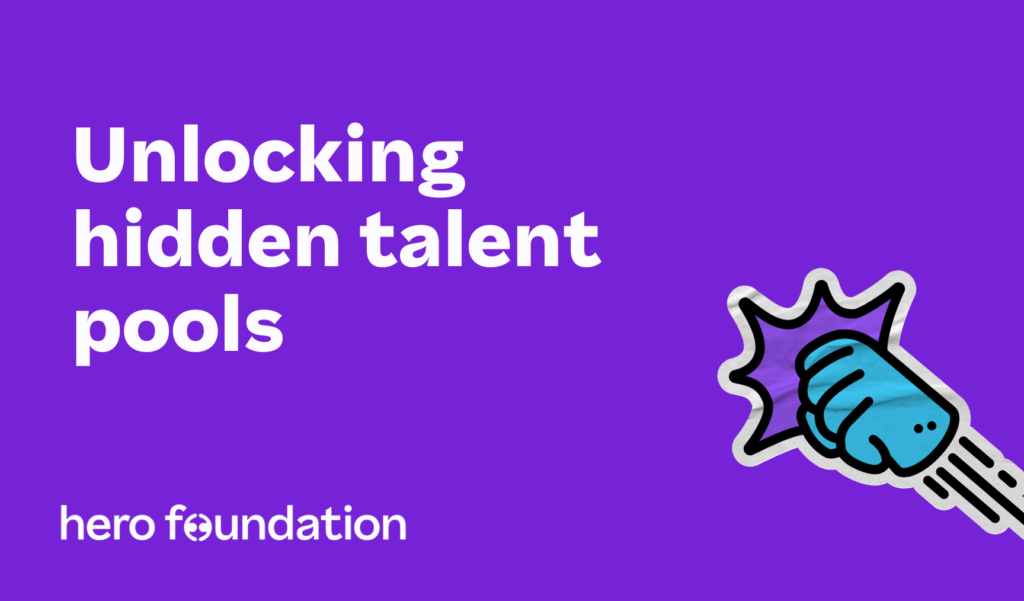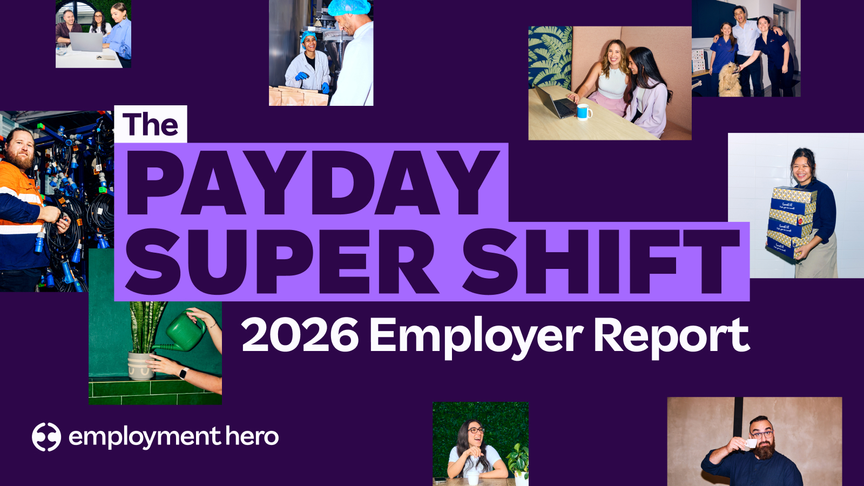Unlocking Hidden Talent Pools: A Smarter Way To Find Job-Ready Candidates

Contents
Across Australia, business owners are saying the same thing: it’s never been harder to find great people. Job ads are live, interviews are happening, yet the right candidates aren’t coming through.
Employment Hero’s own research tells a similar story. In our 2025 Recruitment Report, six in ten HR managers say attracting talent is one of their top challenges. 40% of SMEs aren’t satisfied with the applicants they get from external job boards. And nearly 90% of business leaders have experienced being understaffed in the past year, with almost half personally stepping in to cover the shortage.
Meanwhile, the Australian Bureau of Statistics reports 1.7 million people want to work but can’t find a job. Over a million of them are available to start immediately.
We don’t have a talent shortage. We have a visibility problem. Thousands of capable people are being overlooked because our systems are built to screen for previous experience, not potential.
Who are these hidden workers?
At Hero Foundation, we call them hidden talent. They’re the caregivers who’ve stepped out of the workforce to raise children or care for family. The migrants and refugees whose qualifications aren’t recognised here. People with disabilities or who are neurodivergent, who are fully capable of working but are often excluded by rigid or outdated screening processes.
These are people who are job-ready, qualified, and deeply motivated. They bring diverse skills and life experience and a strong desire to contribute.
Through our partnerships with social-purpose organisations such as Generation Australia, Australian Spatial Analytics, Future Women and Fitted for Work, we’re helping connect this hidden talent with the businesses who need them most. Because what’s often missing isn’t ability – it’s opportunity.
Why traditional hiring misses them
Charlotte Woolford leads Commonwealth Bank’s Career Comeback Program, an initiative dedicated to supporting professionals returning to the workforce after a career break of 2 years or more. During a recent webinar with the Hero Foundation, she summed it up perfectly:
“Traditional hiring filters are often designed to avoid risk, not to discover potential.”
Hiring systems are built for speed and familiarity, typically shortlisting by degrees, job titles, and linear career paths. This focus on the “perfect” candidate often excludes those with non-traditional journeys who may actually be more capable, more adaptable, and more loyal.
Charlotte explained that the bias starts with job ads themselves. Studies show men apply when they meet around 60% of the criteria, while women wait until they meet 100%. Add to that the lack of part-time roles (just 0.7% of all Product Manager jobs on SEEK are listed part-time) and you have a system that unintentionally screens out entire groups of skilled workers. It’s no wonder small businesses are missing out on the very talent they need most.
The business case for inclusive hiring
Research continues to show strong associations between diversity and business performance. McKinsey’s 2023 Diversity Matters study, for instance, found that companies with greater gender and ethnic diversity were more likely to outperform their peers – namely because that diversity brought broader perspectives, innovation and problem-solving.
Similarly, Accenture’s global survey found that nearly two-thirds of businesses who hired from overlooked or “hidden” talent pools saw those employees outperform traditional hires on productivity, innovation, and work ethic.
Closer to home, Generation Australia, one of our key partners, reports 85% of their graduates remain in their roles after 12 months. Compared to an industry average turnover of 25%, this indicates that hiring from these hidden talent pools drives retention and long-term value.
Real-world stories of possibility
One of our success stories comes from an existing Employment Hero customer, SEQUAL, who provides disability-support within their community. They partnered with Hero Foundation after struggling with high turnover and a desire to give more people the opportunity to secure work. Despite receiving hundreds of applications per role, they found that many hires left within months and staff retention was becoming an expensive and time-consuming issue for the organisation.
By looking at candidates who may have previously been rejected based on a lack of qualifications or previous experiences, this customer has now hired two Hero Foundation candidates due to the strength of their dedication, work-ethic and commitment to the values of their organisation.
The benefits and impact has been immediate:
In partnership with Employment Hero and the Hero Foundation we hired our first Hero Foundation candidate, and we couldn’t be more pleased.
From the start, she demonstrated a positive, can-do attitude and showed great openness to new opportunities, including flexibility with locations and availability.
She is engaging with clients, reliable, proactive in suggesting improvements, and confident in seeking advice when unsure.
She consistently takes initiative, including picking up shifts at short notice. While she may not have had the same level of professional experience as some other candidates, she brings a passion for the sector and a commitment to our team and clients that is invaluable.
The success of that placement shifted the company’s hiring mindset. They’ve since continued to explore overlooked talent pools, confident that great hires often come from unexpected places.
Practical shifts and next steps for small businesses
If you’re leading a small or scaling business, change doesn’t need to be complicated. Here are five practical ways to start:
1. Rethink job descriptions
Focus on what’s truly required to perform the role. Consider whether it is possible to replace blanket statements like “Bachelor’s degree required” with tangible outcomes such as “Able to manage budgets and deliver accurate reports.”
2. Remove unnecessary filters
Question your hiring defaults. Does the role really require five years in the same industry, or could those skills exist elsewhere?
3. Offer flexibility
Flexibility doesn’t have to mean remote work – especially in sectors like care, hospitality, or frontline services where being on-site is essential. What does make an impact is offering options that support different life circumstances. This could mean part-time pathways, staggered shifts, school-friendly hours, job-sharing, or shorter probationary contracts that transition into permanency.
4. Pilot one inclusive hire
You don’t need a big program to make a big impact. Start small and go from there. Trial one hire through a partner like Hero Foundation and build confidence and trust within your workplace. Early success builds confidence to scale and diversify your sources of talent.
5. Partner with organisations that make it easier
Hero Foundation connects employers directly with job-ready candidates from trusted social purpose partners. We also provide onboarding support, platform discounts, marketing opportunities, and help celebrate your success stories to inspire others.
The bigger picture
Hero Foundation was created to make employment easier and more valuable for everyone for those facing barriers to employment. We know that one job doesn’t just change a life; it changes families, communities and businesses.
For employers, this is a chance to solve talent challenges and do good at the same time. You don’t have to choose between performance and purpose, by working with the Hero Foundation you can have both.Are you ready to explore new talent pathways? Share your hiring needs with us at Hero Foundation. We’ll connect you with organisations and work-ready talent, and support you through recruitment, onboarding and beyond.
Related Resources
-
 Read more: The Payday Super Shift: 2026 Employer Readiness Report
Read more: The Payday Super Shift: 2026 Employer Readiness ReportThe Payday Super Shift: 2026 Employer Readiness Report
New research on the cash flow risk and compliance gaps facing Australian employers. Download the report now and access industry…
-
![Restaurant Industry Award Summary [MA000119]](https://employmenthero.com/wp-content/uploads/2026/02/Award-Summary_Restaurant-Industry.webp) Read more: Restaurant Industry Award Summary [MA000119]
Read more: Restaurant Industry Award Summary [MA000119]Restaurant Industry Award Summary [MA000119]
This Award primarily applies to businesses operating restaurants, cafés and similar establishments, but also extends to employees performing similar roles.
-
![Manufacturing and Associated Industries and Occupations
Award Summary [MA000010]](https://employmenthero.com/wp-content/uploads/2026/01/Award-Summary_Manufacturing-Industry.webp) Read more: Manufacturing and Associated Industries and Occupations Award Summary [MA000010]
Read more: Manufacturing and Associated Industries and Occupations Award Summary [MA000010]Manufacturing and Associated Industries and Occupations Award Summary [MA000010]
The Manufacturing Industry Award covers employers and employees who work in manufacturing or associated industries.























